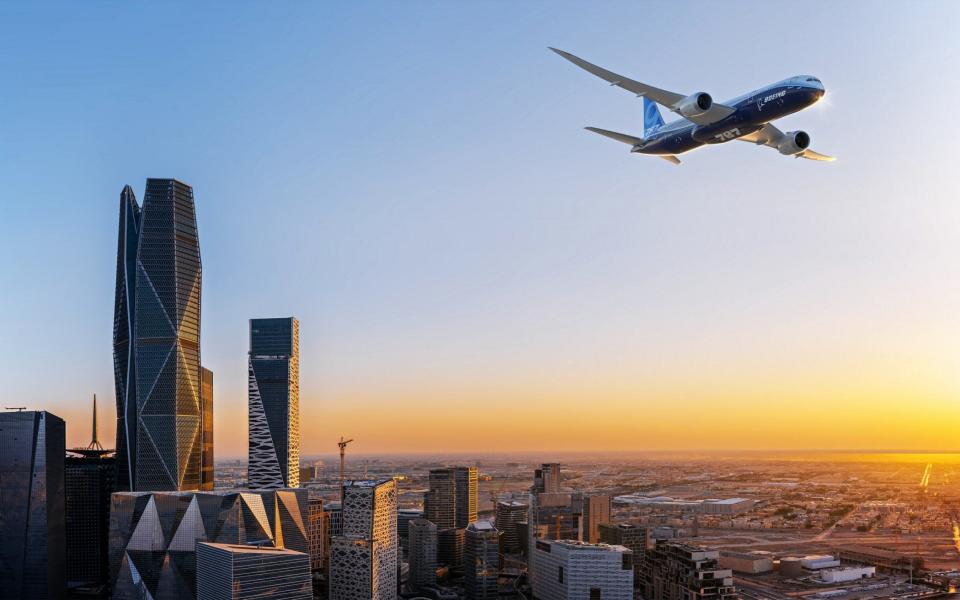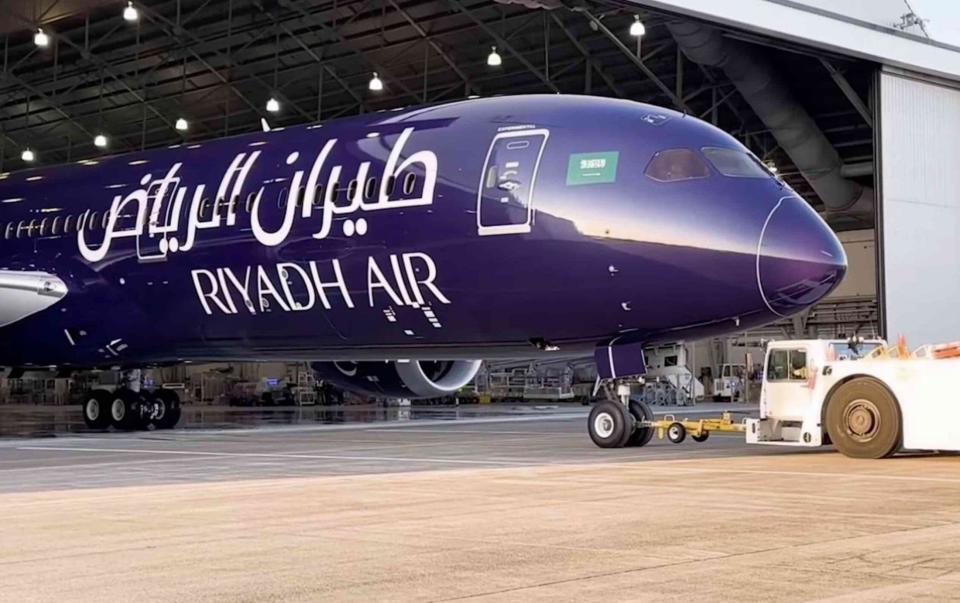The Lancastrian boss plans a new airline from Saudi Arabia to serve 100 cities with a fleet of 200 jets as part of the Kingdom’s bid to become a global tourism hub.
However, rather than dealing with the Middle East’s dominant airlines, Tony Douglas wants to build a “world-class national carrier” by winning back long-neglected travelers from Saudi Arabia.
Mr Douglas, 61, says limited international flights from Saudi airports have left locals dependent on hubs in the United Arab Emirates and Qatar for connections to the rest of the world.
This is despite the IMF forecast that the Saudi economy will be the second fastest growing in the world this year.
Mr Douglas is the person primarily responsible for revamping the country’s connectivity, overseeing plans to launch Riyadh Air.
His fledgling carrier is due to begin services next summer, leading a push by Crown Prince Mohammed bin Salman to diversify the Saudi economy.


The best way is to start a new carrier from scratch, and most airline startups fail within a few years.
But the challenge facing Mr Douglas is even tougher, with Riyadh Air poised to compete against the might of Emirates, Qatar Airways and Etihad.
Dubai-based Emirates is the world’s largest carrier on international routes and all three are industry heavyweights with global networks across five continents.
However, Mr Douglas, who was born 13 miles from Liverpool in Ormskirk, and who jumped ship from Etihad to take the Saudi job, told the Telegraph that his mission was not to take on the Gulf giants at their own game by compete for global passenger flows.
Instead, Riyadh Air will seek to recapture traffic that Saudi Arabia considers its own, while providing the improved global connections required by Vision 2030, which aims to raise Saudi tourist numbers to 100 million a year.
He said: “It is no secret that Saudi Arabia has long lagged behind in terms of global connectivity, and there is no good example anywhere in the world of a sustainable, fast-growing economy that does not have good connectivity .
“The Kingdom needs a new state-of-the-art national carrier that will be its own version of Emirates and Qatar Airways, and Riyadh Air is the answer.”


Mr Douglas, speaking at the International Air Transport Association’s annual summit in Dubai, said Qatar Air’s base in Doha – a 45-minute flight from Riyadh – counts Saudi nationals as its single largest market for business and first class bookings. excellent
More than 80 percent of the people who use the airport are flying on to another destination, the boss said.
He said: “The cliché is that Emirates has been India’s national carrier for the past 40 years. The parallel is that Qatar Airways is the national carrier of Saudi Arabia, at least for high-end traffic.”
It’s a similar story for foreign nationals drawn to Saudi Arabia by the opportunities created by the economy’s $1 trillion diversification plan, but they tend to use Emirates and Dubai to get there.
Mr Douglas said: “The world of talent is flooding into Riyadh because of what is going on with the economy, the giga projects and the other economic diversification themes. Consultants, bankers, financiers, architects.
“But they are flying to Dubai to go to Riyadh because there are not many direct flights.” The level of demand is such that the route is the sixth busiest in the world, he said.
It is no longer acceptable for an oil-rich state with the largest economy in the Arab World and 36 million people to be so dependent on smaller neighbors and a third of the population combined given Saudi growth plans, said Mr. Douglas.
He said: “It is completely wrong. That’s our mandate – to change that. We’re really excited about it.”


Not that Riyadh Air intends to enter the fray alone. Behind the scenes the company is busy recruiting a network of partners that will allow it to sell tickets worldwide under their flight code, but will carry passengers in its own plane for part of the journey.
Riyadh Air last year signed a partnership agreement with Turkish Airways, which has the largest network of any carrier, serving more than 300 destinations in 120 countries.
It has also reached an agreement with joint operator Saudia, based in Jeddah – from where it serves the Hajj pilgrimage to Mecca.
Mr Douglas greatly expanded his airline’s support network last week when it announced tie-ups with Singapore Airlines, Air China and China Eastern, three of Asia’s biggest carriers, as well as Egyptair.
He said: “At the moment everyone is very interested in Saudi Arabia, which has given us a unique position in the conversations with the big international A-listers.”
Singapore Air will provide onward connections to eight destinations in Australia and three in New Zealand, as well as locations throughout Southeast Asia. Meanwhile, Turkish Airlines will fly passengers into central Europe.
Riyadh Air is now targeting a partner in the United States, as well as Western Europe and India, as it looks to complete its ring of alliances.
The airline has not yet revealed its own route network but will serve its partners’ main bases and, within the first three years, will start flying to all major cities in western Europe, the north-east of the US, the sub-region of India and the Far East, as well as the Gulf, he said.
To achieve this ambition, Riyadh Air has ordered 72 Boeing 787 Dreamliner aircraft seating 290 people, and the airline is expected to announce several new narrow-body jets soon.


The airline will begin test flight hours later this year to qualify for its operating certificate by the end of 2024.
In preparation for next year’s launch, Riyadh Air is looking to establish its brand on the global stage.
The company recently announced that local Saudi couturier Ashi, who has dressed Beyonce and Penelope Cruz, would create a cabin crew fashion line to be unveiled in Paris later this month. The look will be a “fantastic, elegant, refined fashion statement”, Mr Douglas said.
The airline has commissioned two different streams of its planes, which it said are “like a billionaire Gulfstream G650 business jet”, rather than commercial aircraft.
Riyadh Air’s interior will be equally striking, he claimed, with the overall effect harkening back to the “halcyon days” of his Pan Am flights in the 1960s.
The carrier aims to be operating at a global level in its own right within three years, ready to serve a series of global events expected to take place in Saudi Arabia, including the 2029 Winter Olympics, Expo 2030 Riyadh, and the World Cup 2034. .
Mr Douglas said the aim is clear: “This is mainly about the connectivity of Saudi Arabia. It is not under a transfer model anytime soon, as there is only so much demand for flights to Riyadh.
“The place right now is at hyper-speed.”